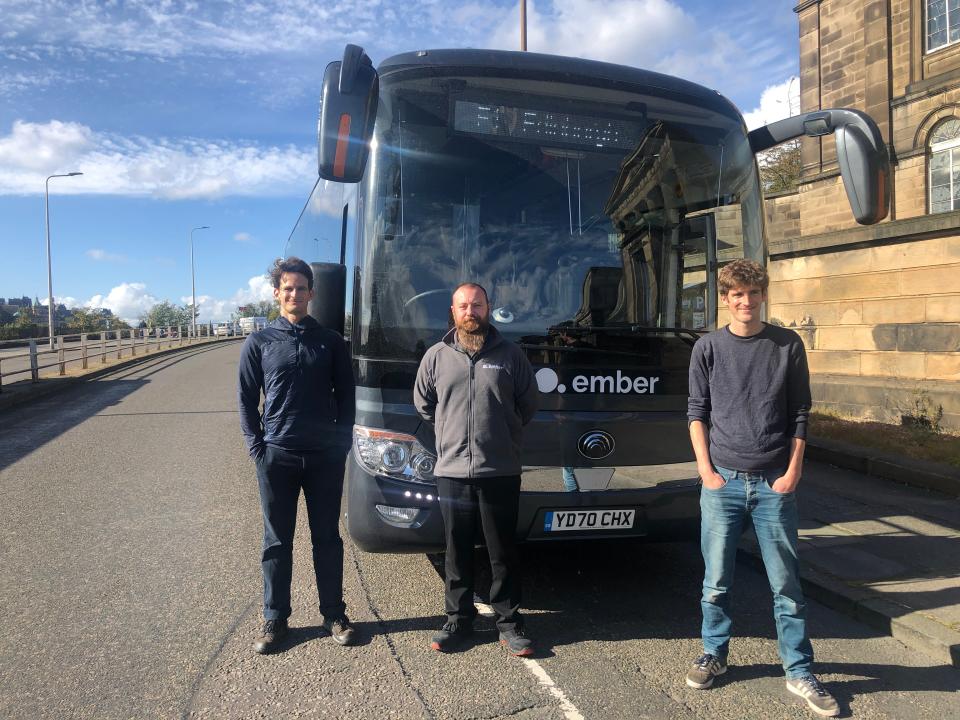Zero-emissions electric bus service launched between Edinburgh and Dundee

Two British entrepreneurs are on the brink of launching a transportation revolution: an inter-city shuttle using an electric-powered bus.
Starting at 5.30am on Thursday morning, a smart new 45-seat coach will depart from Dundee for a 90-minute journey to Edinburgh.
Unlike the existing diesel-powered bus and rail links between the cities, the new service – branded Ember – is 100 per cent electric, with zero direct emissions.
While electric buses are used for some local journeys in the UK, this is the first time that British cities a long way apart have been linked.
The Independent joined a proving run from Dundee with the founders, Keith Bradbury, 38, and Pierce Glennie, 30.
They chose Dundee (slogan: one city, many discoveries) because of the council’s existing enthusiasm for electric vehicles – which even include bin lorries.
“This is how you get people out of cars,” said Mr Bradbury, as driver Mark Addison accelerated away from the city on the road to Perth.
“People have negative perceptions of bus or coach, and we’re here to change those.
“Drivers will realise that you can take an electric coach with zero emissions to Edinburgh, you don’t have to pay for parking, and it gives a better prospect for a day out.”
With no significant engine noise, conversations can be conducted quietly even while travelling down the M90 at 60mph.
The Chinese-made Yutong coach can hold 55 people but has been configured with 45 seats to provide extra comfort. While the coronavirus crisis prevails, it will operate at half capacity.
The founders accept the timing is not ideal, given the slump in travel and economic activity.
“However,” said Mr Bradbury, “there’s never a bad time to be launching a zero-emission transport business.”
As with the UK’s other innovative coach company, Snap, bookings are made online – but drivers are equipped with iPads that will allow them to sell tickets to “walk-up” customers.
That option could be critical to the success of the venture, because as well as serving the two cities it also links smaller communities where they can be served without a significant time penalty. So the small town of Inchture, east of Perth, gets a direct link to Edinburgh as well as local services to Kinross and Rosyth.
The flat fare for the full 60-mile journey will be £7.50, compared with £20 on Scotrail diesel trains and £18.60 on a Citylink bus.
The vehicle itself costs around £360,000, about one-third more than a conventional diesel coach of similar spec.
But the savings on fuel are remarkable. Filling up for 200 miles of travel costs around £40 – a quarter of the cost of diesel for the same distance.
Mr Glennie said: “Running costs are much lower and we can pass that benefit on to customers.”
“It allows you to open up routes that wouldn’t be viable with diesel buses,” said Mr Bradbury.
Ember will run eight daily services each way, and aims to build up a network within Scotland, with Dundee-Glasgow and Edinburgh-Glasgow under consideration – the latter possibly continuing to the city’s airport.
A key limiting factor is the power supply. The city installed an HGV charging point in Greenmarket, west of the city centre and near the railway station, which the new service is using.
The high-speed charging system requires as much electricity as a small housing estate would use, and therefore the service is designed around the availability of power.
“We can comfortably run from Dundee to Edinburgh and back and still have 30 per cent of our power left, so we never run it down to zero,” said driver Mark Addison.
“It’s smooth, there’s no diesel smell, it’s not bumpy, we’ve arrived in Edinburgh in a flash from Dundee,” said Paul Charles, travel consultant from the PC Agency who was also on board.
“They can be dynamic, flexible, they can make decisions faster.
“It’s precisely the sort of company that will do well around the world.
“As long as they can convince electric is the way forward – which surely they have to do in a post-Covid world – then they should do very well.”
The travelling public will be able to decide what they make of Ember from the start of October.
Read more

